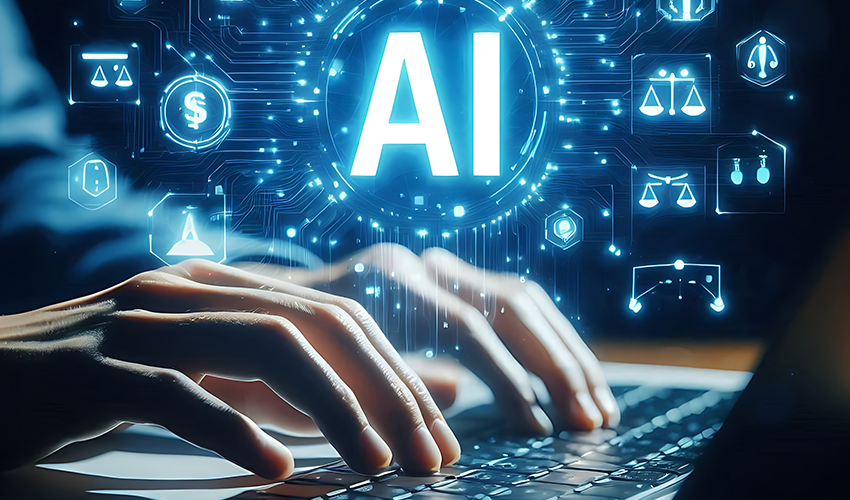
The rapid rise of Artificial Intelligence (AI) has transformed numerous industries, with digital marketing being one of the most impacted. AI is no longer a futuristic concept—it’s an essential tool that shapes how businesses interact with customers, optimize strategies, and enhance overall marketing efforts. In this blog, we'll explore the role of AI in digital marketing and how it is reshaping the landscape.
One of the most significant advantages of AI in digital marketing is its ability to personalize experiences for users. AI-powered algorithms analyze large sets of data about consumer behavior, preferences, and interests, allowing marketers to create tailored campaigns that speak directly to individual needs. This personalization increases engagement, conversion rates, and customer loyalty.
For example, AI enables:
• Dynamic Content: Websites and emails that adjust content in real-time based on user behavior.
• Product Recommendations: Personalized suggestions based on previous purchases or browsing history, as seen with e-commerce giants like Amazon.
AI thrives on data, and digital marketing relies heavily on data to craft effective campaigns. AI tools can analyze massive amounts of data much faster than humans, providing insights that help marketers make smarter decisions. By predicting trends, identifying consumer segments, and suggesting optimizations, AI enables more accurate and data-driven decision-making.
Key areas include:
• Audience Insights: AI can analyze customer demographics, buying patterns, and engagement metrics to build better audience profiles.
• Predictive Analytics: Marketers can forecast which products or services will perform best, based on historical data and trends.
AI tools automate routine tasks, allowing marketers to focus on higher-level strategy and creative endeavors. Automation powered by AI can handle tasks like:
• Email Marketing: Automated workflows can send personalized emails at the right time based on user actions, ensuring consistent communication.
• Social Media Management: AI tools can schedule posts, curate content, and even respond to customer inquiries through chatbots.
• Ad Campaigns: AI can adjust bidding strategies in real-time for online ads, ensuring marketers get the most value for their ad spend.
While creativity remains a human strength, AI can assist in content creation by generating headlines, product descriptions, and even blog posts. AI-driven tools like GPT-based models can produce compelling copy, saving time and enabling content creators to scale their output. Additionally, AI can help in:
• Content Optimization: Tools can suggest SEO improvements and tailor content to match user intent.
• Video and Image Generation: AI can automate the creation of personalized visuals and video content for different platforms.
AI-powered chatbots are increasingly used in digital marketing to provide 24/7 customer support, answer FAQs, and guide users through the buying process. These chatbots simulate human-like conversations and can handle multiple customer interactions simultaneously, reducing the workload for customer service teams while enhancing the user experience.
Benefits include:
• Instant Responses: AI chatbots provide immediate answers, improving customer satisfaction.
• Lead Generation: Chatbots can guide potential customers through a sales funnel by offering relevant suggestions based on their inquiries.
AI is revolutionizing online advertising through programmatic marketing—using machine learning to buy and optimize ads in real-time. These AI-driven ad platforms analyze consumer data and behavior to display the right ad to the right user at the right time, minimizing waste and improving ROI.
With programmatic advertising, AI can:
• Optimize Ad Placement: Determine which platforms and times will yield the highest engagement for ads.
• Adjust Ad Spend: Dynamically adjust budgets based on performance metrics.
The rise of voice assistants like Siri, Alexa, and Google Assistant has shifted the way users search for information. AI helps marketers optimize for voice search by analyzing natural language patterns and conversational queries. As voice search becomes more prevalent, marketers will need to adjust their SEO strategies to capture this growing segment.
Understanding customer behavior is the key to successful marketing. AI can analyze data from multiple touchpoints, such as social media interactions, website visits, and email engagement, to create a complete picture of the customer journey. This deep insight helps marketers:
• Segment Audiences: Group users based on specific behaviors, preferences, or buying stages.
• Target Ads More Effectively: Serve relevant content to users at different stages of their journey.
AI is no longer a luxury but a necessity for businesses looking to stay competitive in digital marketing. From enhancing personalization and automating tasks to improving customer experiences and driving data-driven decisions, AI empowers marketers to operate more efficiently and effectively. As AI continues to evolve, its role in digital marketing will only become more prominent, shaping the future of how brands connect with their audiences. Incorporating AI into your digital marketing strategy isn't just about staying ahead of the curve—it's about delivering better value, improving customer satisfaction, and driving growth.

Let's Connect
Don't wait until tomorrow. Talk to one of our consultants today and learn how to start leveraging your business.